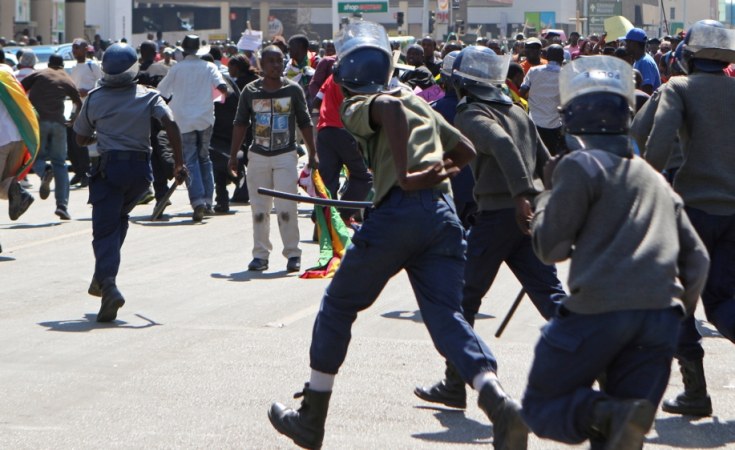As SADC leaders gather in Harare for their annual summit, Zimbabwe's government rounds up perceived "enemies of the state."
In theory, the Southern African Development Community, or SADC, aims to promote regional integration in order "to achieve economic development, peace and security, and growth, alleviate poverty, enhance the standard and quality of life of the peoples of Southern Africa, and support the socially disadvantaged." In practice, Zimbabwe's governing authorities are preparing to host the upcoming SADC summit by terrorizing political opponents, student activists, labor organizers, and community leaders--disrupting the peace and security of Zimbabwean citizens in a quest to silence anyone who might point out the way government corruption impedes economic development.
It's certainly true that Zimbabwe's government engages in repression as a matter of regular order; its record of documented human rights abuses is decades-long. But recently, President Emmerson Mnangagwa has been explicit in suggesting that his perceived political enemies wish to disrupt the summit, justifying the ratcheting up of draconian measures including torture, disappearances, and beatings of peaceful protesters in the name of being a good host. In his Orwellian telling, his government's violent crackdown will ensure tranquility.
Mnangagwa's position is as revealing as it is absurd. When he and his deputies speak about peace and security, they mean peace and security for themselves, not for the people of Zimbabwe as a whole. When they talk about prosperity, they are talking about enriching themselves, not the citizenry as a whole. They claim that opponents, activists, and whistleblowers are agents of shadowy foreign powers because they confuse their own interests with the national interest. Protecting their access to power and wealth is their entire raison d'etre. Sadly, too many governments of SADC member states understand their purpose the same way. That's why they merely "noted" the substantial problems with Zimbabwe's last elections, and it's why they will feign ignorance of the campaign of terror unleashed in preparation for their visit to Harare.
One might imagine that the recent pivotal South African elections--which illustrated how popular discontent with corruption and unmet promises can dent the political power of even the most storied liberation party on the continent--would prompt reflection and reform in the region. But in Zimbabwe, the lessons learned have prompted the powerful to cling even more tightly to their privilege, and dole out punishment to the very people they claim to represent.


